Posts Tagged ‘Independent Chinese PEN Center’
PEN Journey 37: Bled: The Tower of Babel—Part Two
PEN International celebrates its Centenary in 2021. I’ve been active in PEN for more than 30 years in various positions and now as an International Vice President Emeritus. With memories stirring and file drawers of documents and correspondence bulging, I am a bit of a walking archive and have been asked by PEN International to write down memories. I hope this personal PEN journey will be of interest.
At PEN’s 71st World Congress in June 2005 over 275 writers from 88 PEN Centers gathered from around the world in the idyllic setting of Bled, Slovenia where history had been made 40 years before. In 1965, PEN had held its Congress in Bled, the first in Eastern Europe since the Second World War. Russian writers visited PEN for the first time. At that 33rd World Congress, American playwright Arthur Miller, who’d recently passed away in 2005, had been elected the first and only American President of International PEN.

Lake Bled in Bled, Slovenia, site of PEN International’s 71st World Congress, 2005
In 2005 the global dynamics had changed. PEN now had active centers in most of the countries in the former Communist Eastern bloc, including in Russia. The European Union (EU) was in its ascendancy; 2005 marked Slovenia’s accession into the EU. Globalization was bringing benefits but also threats to the cultures of smaller countries.
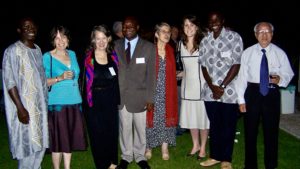
Reception 71st PEN Congress in Bled, 2005. L to R: Frank Asare Donkoh (Ghana PEN), Jane Spender (Program Director PEN International), Joanne Leedom-Ackerman, (PEN International Secretary), Alfred Msadala (Malawi PEN), Cecilia Balcazar (Colombian PEN), Caroline McCormick Whitaker (PEN Executive Director), Dan Khayana (Uganda PEN), Bao Viet Nguyen-Hoang (Suisse Romand PEN) [Photo credit for many photos: Tran Vu]
“We live in an age when many preconceived ideas, nurtured for centuries and ostensibly immutable, are no longer valid,” noted Slovene PEN President Tone Peršak. “The linguistic and cultural image of the world is in flux and civilization as a whole, under the influence of globalization, is taking on a new character. These events are also echoed in discussions within PEN centers…They guided us in our selection of the main topic for discussion at the Congress, namely the issue of linguistic and consequently cultural diversity of the world. The topic is proposed as a question: does linguistic diversity stimulate or hinder cultural development? Is it a curse or a blessing that made possible the emergence and encounter of various world views, different emotional responses to the human destiny, and finally also brought about the formulation of different schools of thought and philosophical doctrines?
“We regard the question of linguistic and cultural diversity also as a human rights issue. Attempts to unify and subject all aspects of life to uniform standards and norms is viewed as a very questionable encroachment on these rights. One of the topics is therefore the question of the need to protect languages and cultures, and that means also the smallest ones which may be on the verge of extinction. Let us also draw your attention to literature’s role in the preservation of the memory of the cultural landscape, which has been undergoing considerable changes and in some cases may even disappear forever…[Is] literature a kind of lingua franca which could and should contribute to a better mutual understanding and insight into the different cultures and nations that sustain cultural diversity?”
These were questions without definitive answers, but questions that occupied writers from dozens of cultures and languages in the Congress’s literary sessions. [At PEN Congresses, the main sessions and the Assembly of Delegates were usually translated into PEN’s three official languages—English, French and Spanish—and also the language of the Congress host.]
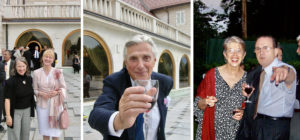
PEN International Congress Bled, Slovenia 2005. L to R: Joanne Leedom-Ackerman (PEN International Secretary), Monika Van Paemel (Belgium (Dutch-speaking) PEN), Alexander Blokh (French PEN and former PEN International Secretary), Cecilia Balcazar (Colombian PEN), Jiří Gruša (President, International PEN)
A number of the delegates had before been to Bled, home of PEN International’s annual Writers for Peace Committee conference, hosted by Slovene PEN. During the Cold War the Peace Committee, founded in 1984, provided one of the only open forums for dialogue between writers from the East and West.
“Let us learn the language of our neighbors so that we all may better come to know and understand our neighbors and forestall incomprehension and conflict,” the Peace Committee and the Congress organizers urged.
In my own address to the Congress as International Secretary, I relied on the prevailing metaphor of the bridge, using an example close to home:
I recently crossed a soaring new bridge in Boston, Massachusetts, a bridge at least 14-years in the making. This bridge spanning the Charles River was the result of what is called the Big Dig, a project anyone who has lived in or regularly visited Boston has come to think of as the Eternal Dig for it is hard to remember when a large segment of downtown wasn’t under construction. But at last there is this soaring bridge with stanchions into the sky in gracious arcs and at night a blue light shining up into its cables as it rises above the city. There is also an elaborate network of freeways and tunnels underground.
I sometimes think International PEN is a bit like the Big Dig. For much of the last decade we’ve been reconstructing ourselves, trying to reflect in our governing structures the expansion that PEN has experienced across the globe, an expansion brought on in part by the opening up of societies after the fall of the Berlin Wall and the lifting of the so-called Iron Curtain. This expansion has also been enabled by the linking of the globe through the internet. International PEN has instituted a Board, been through a long range planning process, revised rules and regulations, and while we still have construction going on and probably always will, I’m hopeful that we too will start to see more and more of the benefits of all this work…Throughout we’ve continued to witness remarkable activities from our Centers…
This year I’ve been telling people that PEN is a place where cultures don’t clash but communicate. PEN members may not always agree, in fact frequently don’t agree, but the fellowship among members can keep that disagreement from turning into confrontation. At our best PEN’s forums offer a place where the energy of competing ideas releases light, rather like that spectacular blue light which shoots upwards on the cables of the grand bridge in Boston.
Arthur Miller once described PEN: “With all its flounderings and failings and mistaken acts, it is still, I think, a fellowship moved by the hope that one day the work it tries and often manages to do will no longer be necessary. Needless to add, we shall need extraordinarily long lives to see that noble day. Meanwhile we have PEN, this fellowship bequeathed on us by several generations of writers for whom their own success and fame were simply not enough.”
The work included substance and form, the latter focusing on the organizational structure which allowed the work to go forward. At the Bled Congress the delegates approved procedural reforms, broke into workshops to discuss PEN itself and global and regional issues, and were introduced to PEN’s first Executive Director, who would begin the following month. After an extensive search, the board and staff had agreed to hire Caroline Whitaker (née McCormick) who had worked in theater development, had a degree in literature and was coming to PEN from the Natural History Museum where she was Director of Development.

Writers in Prison Committee and Workshop Sessions, PEN International Congress, Bled, Slovenia, June 2005
At the Congress seven candidates from Algeria, Colombia, Croatia, France, Finland, Japan, and Russia ran for positions on the International Board, and Mohamed Magani (Algerian PEN), Sibila Petlevski (Croatian PEN), Sylvestre Clancier (French PEN), and Takeaki Hori (Japan PEN) were elected.
The Congress discussed and passed over 20 resolutions and actions challenging the situations for writers in Algeria, Basque region of Spain, Belarus, Burma, China, Cuba, Iran, Maldives, Mexico, Nepal, Russia, Syria, Tibet, Uzbekistan, and Vietnam as well as resolutions relating to the attacks on journalists in war zones and the crackdown on internet writing in Tunisia where the World Summit on the Information Society was to be held that fall.
The Congress also noted the tenth anniversary of the death of PEN member Nigerian writer Ken Saro-Wiwa. International PEN President Jiří Gruša noted: “We are living in a time of extraordinary threats to writers and the freedom to write. In the ten years since our colleague Ken Saro-Wiwa was executed in Nigeria, hundreds of writers and journalists around the world have died by violence. Crackdowns on internet writers and anti-terrorism legislation have named writers and chilled freedom of expression in a number of countries.
“While our colleagues in countries such as Myanmar, Cuba, China and Belarus continue to struggle against conventional governmental censorship and repression, writers also face the threat of moral violence in countries from Mexico to Iraq and new pressures associated with writing and publishing on the internet.”
Among the guests at the Congress were Colin Channer, who introduced the prospective Jamaica PEN Center which was voted into PEN at the subsequent 2006 Congress in Berlin.
And for the first time since the Tiananmen Square massacre June 4, 1989, a writer from the People’s Republic of China attended as a representative of the new Independent Chinese PEN Center whose members included writers from inside and outside of mainland China. I include below much of his talk which rings truer than ever.
Wang Yi* addressed the Assembly, noting that this was the first time in 16 years “the voice of a non-official and independent Chinese writers’ group could be heard, a group that is independent or at least strives for its independence, that is free or at least longs for freedom and that tries to perpetuate the freedom of expression in the face of great political pressure…
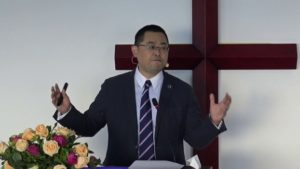
Wang Yi (Independent Chinese PEN Center)
“I come here heavy-hearted without blessing, because there is no reconciliation between a free writer, an independent intellectual, and his government. I come to Bled representing those who have been disgraced, who have stood in the shadow of terror and the peril of political oppression, and who have yet never resigned but have insisted upon their freedom of speech and writing, such as Mr. Liu Xiaobo whose work has been not allowed to be published and who has not been allowed to go abroad. I also come for myself, who experienced in the sixteen years after Tiananmen a long period during which memories have been erased forcefully and silence has been ordered. This has been a time during which mothers, who lost their sons and daughters at Tiananmen, have not been allowed to weep…
“To me and my colleagues, writing is a rescue plan for the hostage. Writing means dignity and freedom; it is kind of belief. But we cannot rescue ourselves, even when we have courage and when justice is on our side in the face of institutional arbitrariness…
“Our salvation depends upon that higher community, depends upon common universal values that we share as writers, as free people and as intellectuals. It is the source of liberty and imagination…
“We are disappointed to see that some European governments are gradually abandoning free values and lessening their criticism of the despotic regime in Beijing. For a common benefit they abandon the writers, reporters, dissidents and orators who are imprisoned…
“According to the Independent Chinese PEN club, more than 50 writers and reporters are currently in jail…
“I want to mention two points: the first one is the belief that through writing, we can enlighten and preserve basic human values. Second, there is a global realistic linguistic environment. These two points make me think that the persecution of Chinese, Tibetan, Uighur and other minority writers reaches across borders to become an international issue…There is only the suppression of the right to freedom of expression and the persecution of human beings, which needs to be rooted out, and the victim needs to be consoled and supported…
“The Chinese government’s suppression of writers has accelerated in recent years, since the beginning of the Internet era…pen names and pseudonyms are prohibited. With this act, the last bastion of self-protection is destroyed.
“Every morning, the Communist Party’s propaganda department issues a list of prohibited news to the media. Whoever dares to break the taboos will get into big trouble. As the government stifles the mouths of the media and betrays the public, it also tampers with the truth in historical textbooks and deceives the children in school. An increasing number of courageous writers, reporters and public figures are daring to challenge the status quo so more and more of them have been thrown into jail on charges of committing the crime of “instigation and subversion of the state” or “disclosing state secrets” to “hostile forces…
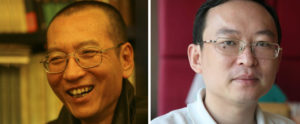
Liu Xiaobo and Yu Jie (Independent Chinese PEN Center)
“Among the harassed and persecuted are also the president of ICPC and his deputy, Mr. Liu Xiaobo* and Mr. Yu Jie*. Under such circumstances, you cannot but regard the Chinese writer as a hostage…
“I come to Bled hoping to present myself as a writer, but I am indeed only a hostage…One of the reasons that I definitely wanted to come is that I believe we all belong to the same world. In this world, the state, the glory and the lawful right all belong to that higher spiritual origin that makes us, without regret, proud to be a writer.”
*[Wang Yi, deputy Secretary General of ICPC 2003-2007, has been imprisoned in China since December 2018, serving a 9-year sentence for “activities disobedient to the government control” and “inciting subversion of state power and illegal business.” Wang Yi is a writer and a Christian pastor. Liu Xiaobo, the second President of ICPC, was sentenced in December 2008 to an 11-year prison sentence as “an enemy of the state” for “incitement of subverting state power.” He was the first Chinese citizen to win the Nobel Prize for Peace in 2010 and died in custody June 13, 2017. Yu Jie, a celebrated writer, was one of the drafters, along with Liu Xiaobo, of Charter 08, which set out a democratic vision for China; he was arrested and tortured in 2010 and immigrated to the U.S. in 2012. He is author of Steel Gate to Freedom: The Life of Liu Xiaobo.]

Lake Bled, Slovenia, site of PEN International 71st World Congress, 2005
Next Installment: PEN Journey 38: PEN’s Work On the Road in Kyrgyzstan and Ghana
Liu Xiaobo: On the Front Line of Ideas
Nobel Laureate Liu Xiaobo died this past July in prison, where he was serving an 11-year sentence for his role in drafting Charter ’08 calling for democratic reform in China. Below is my essay in The Memorial Collection for Dr. Liu Xiaobo, just published by the Institute for China’s Democratic Transition and Democratic China.

I never met Liu Xiaobo, but his words and life touch and inspire me. His ideas live beyond his physical body though I am among the many who wish he survived to help develop and lead democratic reform in China, a nation and people he was devoted to.
Liu’s Final Statement: I Have No Enemies delivered December 23, 2009 to the judge sentencing him stands beside important texts which inspire and help frame society as Martin Luther King’s Letter from a Birmingham Jail did in my country. King addressed fellow clergymen and also his prosecutors, judges and the citizens of America in its struggle to realize a more perfect democracy.
I hesitate to project too much onto Liu Xiaobo, this man I never met, but as a writer and an activist through PEN on behalf of writers whose words set the powers of state against them, I can offer my own context and measurement.
Liu said June, 1989 was a turning point in his life as he returned to China to join the protests of the democracy movement. In June, 1989 I was President of PEN Center USA West. It was a tumultuous year in which the fatwa against Salman Rushdie was issued in February, and PEN, including our center, mobilized worldwide in protest.
In May, 1989 I was a delegate to the PEN Congress in Maastricht, Netherlands where PEN Center USA West presented to the Assembly of Delegates a resolution on behalf of imprisoned writers in China, including Wei Jingsheng, and called on the Chinese government to release them. The Chinese delegation, which represented the government’s perspective more than PEN’s, argued against the resolution. Poet Bei Dao, who was a guest of the Congress, stood and defended our resolution with Taipei PEN translating.
When the events of Tiananmen Square erupted a few weeks later, my first concern was whether Bei Dao was safe. It turns out he had not yet returned to China and never did. PEN Center USA West, along with PEN Centers around the world, began going through the names of Chinese writers taken into custody so we might intervene. I remember well reading through these names written in Chinese sent from PEN’s London headquarters and trying to sort them and get them translated. Liu Xiaobo, I am certain must have been among them, though I didn’t know him at the time.
In his Final Statement to the Court twenty years later, Liu told the consequence for him of being found guilty of “the crime of spreading and inciting counterrevolution” at the Tiananmen protest: “I found myself separate from my beloved lectern and no longer able to publish my writing or give public talks inside China. Merely for expressing different political views and for joining a peaceful democracy movement, a teacher lost his right to teach, a writer lost his right to publish, and a public intellectual could no longer speak openly. Whether we view this as my own fate or as the fate of a China after thirty years of ‘reform and opening,’ it is truly a sad fate.”
I finally did meet Wei Jingsheng after years of working on his case. He was released and came to the United States where we shared a meal together at the Old Ebbit Grill in Washington. I was hopeful I might someday also get to meet Liu Xiaobo, or if not meet him physically, at least get to hear more from him through his poetry and prose.
His words are now our only meeting place. His writing is robust and full of truth about the human spirit, individually and collectively as citizens form the body politic. I expect that both his poetry and the famed Charter 08, for which he was one of the primary drafters and which more than 2000 Chinese citizens endorsed, will resonate and grow in consequence.
Charter 08 set out a path to a more democratic China which I hope one day will be realized.
“The political reality, which is plain for anyone to see, is that China has many laws but no rule of law; it has a constitution but no constitutional government,” noted Charter 08. “The ruling elite continues to cling to its authoritarian power and fights off any move toward political change….
“Accordingly, and in a spirit of this duty as responsible and constructive citizens, we offer the following recommendations on national governance, citizens’ rights, and social development: a New Constitution…Separation of Powers…Legislative Democracy…an Independent Judiciary…Public Control of Public Servants…Guarantee of Human Rights…Election of Public Officials…Rural—Urban Equality…Freedom to Form Groups…Freedom to Assemble…Freedom of Expression…Freedom of Religion…Civic Education…Protection of Private Property…Financial and Tax Reform…Social Security…Protection of the Environment…a Federated Republic…Truth in Reconciliation.”
Charter 08 addresses the body politic. Liu Xiaobo’s Final Statement: I Have No Hatred addresses the individual, and for me resonates most profoundly. Its call doesn’t depend on others but on oneself for execution. He warned against hatred.
“Hatred only eats away at a person’s intelligence and conscience, and an enemy mentality can poison the spirit of an entire people (as the experience of our country during the Mao era clearly shows). It can lead to cruel and lethal internecine combat, can destroy tolerance and human feeling within a society, and can block the progress of a nation toward freedom and democracy. For these reasons I hope that I can rise above my personal fate and contribute to the progress of our country and to changes in our society. I hope that I can answer the regime’s enmity with utmost benevolence, and can use love to dissipate hate.”
At a recent conference a participant asked if Liu Xiaobo might have changed this statement if he understood how his life would end. A friend who knew him assured that he would not for he was committed to the idea. Liu Xiaobo’s commitment to No Enemies, No Hatred does not accede to the authoritarianism he opposed, but instead resists the negative. He aligns with benevolence and love as the power that nourishes the human spirit and ultimately allows it to flourish. Liu’s words and his ideas lived offer us all a beacon and a guide.
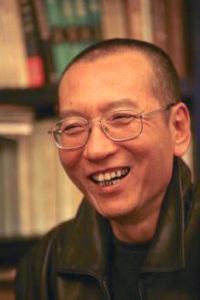
Spring and Release
I saw the first daffodils today…and forsythia…and the buds on cherry blossom trees. Spring with its regalia is starting to blossom, at least here in Washington, DC.
In the freedom of expression community renewal is heralded this week by the release of writers from prison in a number of countries, including Qatar, China and Azerbaijan. While the writers were unjustly imprisoned in the first place and many hundreds still languish in jails because they have offended governing powers, the releases of Qatar poet Mohammed al-Ajami after almost five years in prison and Chinese writers Rao Wenwei and Wang Xiaolu and half a dozen writers in Azerbaijan are cause for quiet celebration.
Qatar: In the fall of 2013 another PEN colleague and I stood outside the sprawling prison in the desert around Doha where Mohammed Ibn al-Dheeb al-Ajami was held in solitary confinement. After meetings with Justice Ministry officials, we’d understood we would be allowed into the prison for a visit. However, after five hours waiting in the desert wind, we were denied access. Al-Ajami’s family, who were visiting inside, told us later that Al-Ajami knew we were there and took some heart in that. Al-Ajami was imprisoned for “insulting the Emir” in two poems which he read at a private apartment in Cairo but which were surreptitiously recorded and posted by a student on YouTube. One of the poems “Tunisian Jasmine” expressed support for the uprising in Tunisia that launched the Arab Spring and challenged rulers throughout the region. Al-Ajami, who is the father of four, was originally sentenced to life in prison, reduced to 15 years.
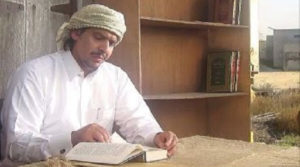
PEN centers around the world, including American, Austrian, English and German PEN worked on his behalf as did Amnesty, Human Rights Watch and other organizations championing freedom of expression. Many voices protested, many hands tried to push open the prison door. Just last week at a Washington dinner I noted Al-Ajami’s imprisonment to an individual headed to Qatar for high level meetings. Those who deal with Qatar are always surprised that this Emirate which boasts education and partnerships with Western universities would imprison a poet for his poems. It is not a comfortable outcome that it is a pardon and not an apology by the Emir which brought about Al-Ajami’s release, but it is still cause to be glad.
China: There are more than 40 writers in prison in China, including Nobel Laureate Liu Xiaobo. Recently two—Rao Wenwei and Wang Xiaolu—were released early. Rao Wenwei is a writer charged with “inciting subversion of the state power” for articles published on the internet. His 12-year sentence was cut short by four years with his release. Wang Xiaolu was arrested for a story on the stock market crash on suspicion of “fabricating and disseminating false information on the trading of securities and futures.” Through the efforts of PEN centers, particularly the Independent Chinese PEN Center, the cases and situation of writers in prison in China stay at the forefront of protests.
Azerbaijan: Half a dozen writers are being released in Azerbaijan this month. The Baku Court of Appeals is expected to release journalist Rauf Mirkadirov today, according to Sports for Rights coalition which includes PEN, commuting his six-year prison sentence to a five-year suspended sentence. President Aliyev has signed a pardon decree that includes 14 political prisoners, including the writers Parviz Hashimli (journalist), Abdul Abilov (blogger), Hilal Mammadov (journalist), Omar Mamedov (blogger) and Tofiq Yaqublu (journalist). The European Court of Human Rights also issued a judgment in Rasul Jafarov’s case finding violations of Rasul’s rights to liberty and security. Rasul is expected to be released shortly. Dozens of political prisoners, however, remain in Azerbaijani jails, including journalists Khadija Ismayilova and Seymur Hezi.
(*For background on any of these cases or the many remaining political prisoners in Azerbaijan, here’s the full list with case details: http://www.helpsetthemfree.org/wp-content/uploads/2016/02/The-list-of-Political-Prisoners-in-Azerbaijan_December-2015.pdf)